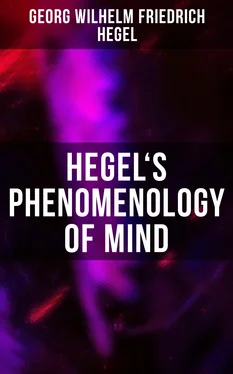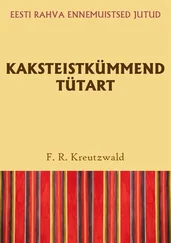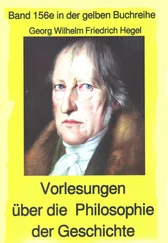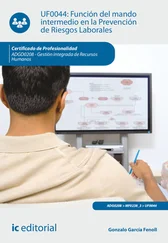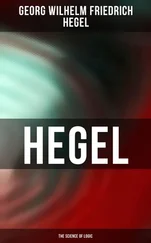Georg Wilhelm Friedrich Hegel - Hegel's Phenomenology of Mind
Здесь есть возможность читать онлайн «Georg Wilhelm Friedrich Hegel - Hegel's Phenomenology of Mind» — ознакомительный отрывок электронной книги совершенно бесплатно, а после прочтения отрывка купить полную версию. В некоторых случаях можно слушать аудио, скачать через торрент в формате fb2 и присутствует краткое содержание. Жанр: unrecognised, на английском языке. Описание произведения, (предисловие) а так же отзывы посетителей доступны на портале библиотеки ЛибКат.
- Название:Hegel's Phenomenology of Mind
- Автор:
- Жанр:
- Год:неизвестен
- ISBN:нет данных
- Рейтинг книги:4 / 5. Голосов: 1
-
Избранное:Добавить в избранное
- Отзывы:
-
Ваша оценка:
- 80
- 1
- 2
- 3
- 4
- 5
Hegel's Phenomenology of Mind: краткое содержание, описание и аннотация
Предлагаем к чтению аннотацию, описание, краткое содержание или предисловие (зависит от того, что написал сам автор книги «Hegel's Phenomenology of Mind»). Если вы не нашли необходимую информацию о книге — напишите в комментариях, мы постараемся отыскать её.
Hegel's Phenomenology of Mind — читать онлайн ознакомительный отрывок
Ниже представлен текст книги, разбитый по страницам. Система сохранения места последней прочитанной страницы, позволяет с удобством читать онлайн бесплатно книгу «Hegel's Phenomenology of Mind», без необходимости каждый раз заново искать на чём Вы остановились. Поставьте закладку, и сможете в любой момент перейти на страницу, на которой закончили чтение.
Интервал:
Закладка:
This contradiction and the removal of it will become more definite if, to begin with, we call to mind the abstract determinations of knowledge and of truth as they are found in consciousness. Consciousness, we find, distinguishes from itself something, to which at the same time it relates itself; or, to use the current expression, there is something for consciousness; and the determinate form of this process of relating, or of there being something for a consciousness, is knowledge. But from this being for another we distinguish being in itself or per se; what is related to knowledge is likewise distinguished from it, and posited as also existing outside this relation; the aspect of being per se or in itself is called Truth. What really lies in these determinations does not further concern us here; for since the object of our inquiry is phenomenal knowledge., its determinations are also taken up, in the first instance, as they are immediately offered to us. And they are offered to us very much in the way we have just stated.
If now our inquiry deals with the truth of knowledge, it appears that we are inquiring what knowledge is in itself. But in this inquiry knowledge is our object, it is for us ; and the essential nature ( Ansich ) of knowledge, were this to come to light, would be rather its being for us: what we should assert to be its essence would rather be, not the truth of knowledge, but only our knowledge of it. The essence or the criterion would lie in us; and that which was to be compared with this standard, and on which a decision was to be passed as a result of this comparison, would not necessarily have to recognize that criterion.
But the nature of the object which we are examining surmounts this separation, or semblance of separation, and presupposition. Consciousness furnishes its own criterion in itself, and the inquiry will thereby be a comparison of itself with its own self; for the distinction, just made, falls inside itself. In consciousness there is one element for an other, or, in general, consciousness implicates the specific character of the moment of knowledge. At the same time this “other” is to consciousness not merely for it, but also outside this relation, or has a being in itself, i.e. there is the moment of truth. Thus in what consciousness inside itself declares to be the essence or truth we have the standard which itself sets up, and by which we are to measure its knowledge. Suppose we call knowledge the notion, and the essence or truth “being” or the object, then the examination consists in seeing whether the notion corresponds with the object. But if we call the inner nature of the object, or what it is in itself, the notion, and, on the other side, understand by object the notion qua object, i.e. the way the notion is for an other, then the examination consists in our seeing whether the object corresponds to its own notion. It is clear, of course, that both of these processes are the same. The essential fact, however, to be borne in mind throughout the whole inquiry is that both these moments, notion and object, “being for another” and “being in itself”, themselves fall within that knowledge which we are examining. Consequently we do not require to bring standards with us, nor to apply our fancies and thoughts in the inquire; and just by our leaving these aside we are enabled to treat and discuss the subject as it actually is in itself and for itself, as it is in its complete reality.
But not only in this respect, that notion and object, the criterion and what is to be tested, are ready to hand in consciousness itself, is any addition of ours superfluous, but we are also spared the trouble of comparing these two and of making an examination in the strict sense of the term; so that in this respect, too, since consciousness tests and examines itself, all we are left to do is simply and solely to look on. For consciousness is, on the one hand, consciousness of the object, on the other, consciousness of itself; consciousness of what to it is true, and consciousness of its knowledge of that truth. Since both are for the same consciousness, it is itself their comparison; it is the same consciousness that decides and knows whether its knowledge of the object corresponds with this object or not. The object, it is true, appears only to be in such wise for consciousness as consciousness knows it. Consciousness does not seem able to get, so to say, behind it as it is, not for consciousness, but in itself, and consequently seems also unable to test knowledge by it. But just because consciousness has, in general, knowledge of an object, there is already present the distinction that the inherent nature, what the object is in itself, is one thing to consciousness, while knowledge, or the being of the object for consciousness, is another moment. Upon this distinction, which is present as a fact, the examination turns. Should both, when thus compared, not correspond, consciousness seems bound to alter its knowledge, in order to make it fit the object. But in the alteration of the knowledge, the object itself also, in point of fact, is altered; for the knowledge which existed was essentially a knowledge of the object; with change in the knowledge, the object also becomes different, since it belonged essentially to this knowledge. Hence consciousness comes to find that what formerly to it was the essence is not what is per se, or what was per se was only per se for consciousness. Since, then, in the case of its object consciousness finds its knowledge not corresponding with this object, the object likewise fails to hold out; or the standard for examining is altered when that, whose criterion this standard was to be, does not hold its ground in the course of the examination; and the examination is not only an examination of knowledge, but also of the criterion used in the process.
This dialectic process which consciousness executes on itself-on its knowledge as well as on its object — in the sense that out of it the new and true object arises, is precisely, what is termed Experience. In this connection, there is a moment in the process just mentioned which should be brought into more decided prominence, and by which a new light is cast on the scientific aspect of the following exposition. Consciousness knows something; this something is the essence or is per se. This object, however, is also the per se , the inherent reality, for consciousness. Hence comes ambiguity of this truth. Consciousness, as we see, has now two objects: one is the first per se, the second is the existence for consciousness of this per se. The last object appears at first sight to be merely the reflection of consciousness into itself, i.e. an idea not of an object, but solely of its knowledge of that first object. But, as was already indicated, by that very process the first object is altered; it ceases to be what is per se, and becomes consciously something which is per se only for consciousness. Consequently, then, what this real per se is for consciousness is truth: which, however, means that this is the essential reality, or the object which consciousness has. This new object contains the nothingness of the first; the new object is the experience concerning that first object.
In this treatment of the course of experience, there is an element in virtue of which it does not seem to be in agreement with what is ordinarily understood by experience. The transition from the first object and the knowledge of it to the other object, in regard to which we say we have had experience, was so stated that the knowledge of the first object, the existence for consciousness of the first ens per se , is itself to be the second object. But it usually seems that we learn by experience the untruth of our first notion by appealing to some other object which we may happen to find casually and externally; so that, in general, what we have is merely the bare and simple apprehension of what is in and for itself. On the view above given, however, the new object is seen to have come about by a transformation or conversion of consciousness itself. This way of looking at the matter is our doing, what we contribute; by its means the series of experiences through which consciousness passes is lifted into a scientifically constituted sequence, but this does not exist for the consciousness we contemplate and consider. We have here, however, the same sort of circumstance, again, of which we spoke a short time ago when dealing with the relation of this exposition to scepticism, viz. that the result which at any time comes about in the case of an untrue mode of knowledge cannot possibly collapse into an empty nothing, but must necessarily be taken as the negation of that of which it is a result-a result which contains what truth the preceding mode of knowledge has in it. In the present instance the position takes this form: since what at first appeared as object is reduced, when it passes into consciousness, to what knowledge takes it to be, and the implicit nature, the real in itself, becomes what this entity per se , is for consciousness ; this latter is the new object, whereupon there appears also a new mode or embodiment of consciousness, of which the essence is something other than that of the preceding mode. It is this circumstance which carries forward the whole succession of the modes or attitudes of consciousness in their own necessity. It is only this necessity, this origination of the new object-which offers itself to consciousness without consciousness knowing how it comes by it-that to us, who watch the process, is to be seen going on, so to say, behind its back. Thereby there enters into its process a moment of being per se, or of being for us, which is not expressly presented to that consciousness which is in the grip of experience itself. The content , however, of what we see arising, exists for it, and we lay hold of and comprehend merely its formal character, i.e. its bare origination; for it , what has thus arisen has merely the character of object, while, for us , it appears at the same time as a process and coming into being.
Читать дальшеИнтервал:
Закладка:
Похожие книги на «Hegel's Phenomenology of Mind»
Представляем Вашему вниманию похожие книги на «Hegel's Phenomenology of Mind» списком для выбора. Мы отобрали схожую по названию и смыслу литературу в надежде предоставить читателям больше вариантов отыскать новые, интересные, ещё непрочитанные произведения.
Обсуждение, отзывы о книге «Hegel's Phenomenology of Mind» и просто собственные мнения читателей. Оставьте ваши комментарии, напишите, что Вы думаете о произведении, его смысле или главных героях. Укажите что конкретно понравилось, а что нет, и почему Вы так считаете.
